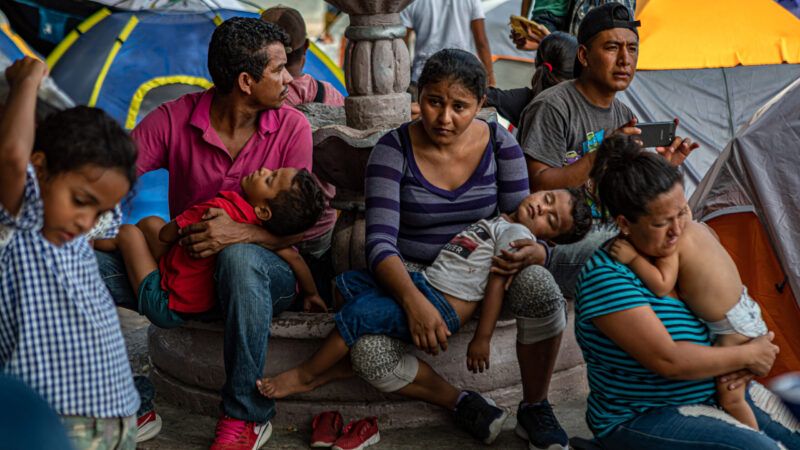Biden Can End 'Remain in Mexico' Border Policy, Says SCOTUS
Scrapping the policy is an important step in restoring a fair asylum-seeking process.

The Supreme Court has ruled that the Biden administration may end a Trump-era border policy known as the Migrant Protection Protocols, or "Remain in Mexico." Chief Justice John Roberts wrote the majority opinion, which was joined by Justices Brett Kavanaugh, Sonia Sotomayor, Elena Kagan, and Stephen Breyer.
Announced by President Donald Trump in 2018 and implemented in 2019, Remain in Mexico required asylum seekers to await their immigration court dates in Mexico. This policy subverted a longstanding practice of generally allowing asylum seekers to stay in the U.S. either in detention or on release while their legal proceedings took place. Under Trump's policy, once migrants arrived at the U.S.-Mexico border to request asylum, they received court dates and were returned to Mexico. There, they often waited in tent cities that sprang up in dangerous border towns. Under Trump, roughly 70,000 people were returned to Mexico; the Biden administration has sent at least 4,300 migrants to Mexico under the program.
President Joe Biden sought to roll back Remain in Mexico upon taking office, with the Department of Homeland Security officially terminating the program in June 2021. Texas and Missouri argued the suspension had created chaos at the southern border and sued the federal government to get the policy reinstated. A federal judge ordered the Biden administration to reinstate the program in August, saying it was illegally repealed. The administration appealed, eventually losing in the U.S. Court of Appeals for the 5th Circuit.
The lower courts had determined that the Biden administration is obligated to either detain all asylum seekers or send them to Mexico prior to their immigration court hearings. The Department of Homeland Security doesn't have enough capacity to detain every asylum seeker, so the courts held that returning migrants to Mexico was the only tenable option.
The Supreme Court set out to determine whether the government's repeal of Remain in Mexico "violated the Immigration and Nationality Act" (INA)—which provides for the attorney general to expel migrants arriving on land from a foreign territory—"and whether the Government's second termination of the policy was a valid final agency action."
"The contiguous-territory return authority…is discretionary," the opinion reads. "The INA itself does not require the Secretary [of Homeland Security] to continue exercising his discretionary authority under these circumstances." Further, the government's termination "did constitute final agency action."
Remain in Mexico has been mired in controversy due to its harmful effects on people who wish to seek asylum in the United States. The State Department ranks Tamaulipas, one of the Mexican border states where migrants have had to wait, as equally dangerous to Syria, Afghanistan, and Iraq. As of February 2021, the nonprofit Human Rights First had recorded at least 1,544 cases of murder, rape, torture, kidnapping, and violent assault among migrants who were returned to Mexico.
Opponents of the policy also cite its ill effects on due process for asylum seekers. The San Diego Union-Tribune reported in 2019 that "asylum seekers who have finished their court dates are being sent back to Mexico with documents that contain fraudulent future court dates, keeping some migrants south of the border indefinitely." Tens of thousands of people were unable to reach courts for their hearings, and a scant 7.5 percent of asylum seekers had secured a lawyer by December 2020, according to the American Immigration Council. And hardly anybody actually secured asylum: By December 2020, just 521 of 42,012 Remain in Mexico cases had won relief.
Scrapping Remain in Mexico is an important step in restoring fairness to the asylum-seeking process at the border. That being said, there are still restrictions on asylum in place that keep migrants in harm's way and deprive them of due process. Until the administration ensures that legal and accessible immigration pathways are available to migrants, people will continue to face the risks that accompany harsh border policy.


Show Comments (159)